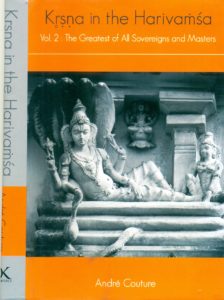
Andre Couture: Krishna in the Harivamsha, vol. 2—the greatest of all sovereigns and masters, DK Printworld, New Delhi.
In 1858 at the age of 18 when Kaliprasanna Singha embarked upon his massive project of translating the Mahabharata (MB) into Bengali, he omitted the Harivansha (HV) finding it patently later in language and style. MB refers to it as khila, appendix. Andre Couture, professor of Indology at the Universite Laval, Quebec, is the only scholar to have studied this neglected text in great detail showing that in order to appreciate the dimensions of Krishna’s character one has to read the HV. Like the sub-tales in the MB, the HV serves to complement the mahakavya.
Western Indologists have argued that the figure of Krishna conflates two separate persons: the child-god, a pastoral deity, and the warrior-hero. In Couture’s first volume he had shown how the childhood tales elaborate the nature of Krishna’s divinity. He is protector of the gopas, creator of a new world and destroyer of demons. Restoring stolen earrings to Aditi, mother of the devas, he also harries Swarga to snatch its Parijata tree. The present work takes this further to argue that instead of being a haphazard anthology of ancient tales of diverse origins the HV is a dextrous weaving of material to portray the universal sovereignty of Krishna. Looking at him merely as a hero fails to explain major elements in his life.
What is most satisfying is that Couture does not restrict himself to the Critical Edition—which leaves out huge swathes of material—but studies the vulgate’s rich repository. Comparing the later accounts of Krishna’s childhood in the Puranas he makes the very important point that the shortest version does not necessarily connote the oldest. Further, thematic content and literary structure remain the only means for studying the received text as its authorship cannot be pinned down. The HV is not an ancient relic. It was a living composition responding to questions from new listeners familiar with ritual practices. The episode about the destruction of the kapittha tree (rejected by the CE), for instance, explains the link between Krishna and Shiva. For Couture, “the various HV versions hide lingering questions…the traditional text adjusts to ever-changing environments while still speaking the same, unchanging mythic language.” These changes reveal what is underlying. Another good example is the fight with Bana. Instead of exemplifying how bards corrupted the text (as the CE editors hold), it shows how pauranikas reworked it to keep the audience interested and explain it to them. He finds that a passage (*1259 after HV 108.98) about Narada meeting Aniruddha and Usha has not been included in the CE although it occurs in all the key recensions. Another such passage (*435 after HV 28.12) is about the origin of the Syamantaka gem His research leads to the conclusion that “the logic underlying the reconstruction of the HV is not always evident. (p.145)”
Beginning with Krishna and Balarama’s initiation at Sandipani’s ashram, Couture shows that it marks stepping into adulthood leading to Krishna’s victory in Dvaraka. In the process he acts as a son in many ways: rescues his parents; resurrects Devaki’s six sons; restores the throne to Ugrasena; restores to his guru his lost son; restores to a Brahmin his four dead sons. Arjuna undergoes similar initiatory rites of passage vis-à-vis Drona and Shiva in the MB. MB and HV follow the same plan.
The paper on Dvaraka shows how it is built following procedures for constructing a temple. That indicates the later date of the HV because the MB does not know temples. Couture holds that HV took shape between 200 and 1200 or 1300 AD. Dvaravati is built as objectifying Vasudeva’s divine self. As Krishna-Balarama are the complementary sheshin and shesha, so is Dvaraka complemented by the sea which retreats to house it. Further, between the two brothers in the city stands their sister Ekanamsha, Krishna’s maya. Their combination in the court that replicates heavenly Sudharma shows that this is a city embodying dharma. Its destruction is wrought by ascetics representing nivritti, withdrawal from creation.
Couture draws a fascinating parallel between Madhuvana and Kushasthali. Shatrughna destroys the former and builds Mathura there. Yakshas and rakshasas destroy the latter and Krishna builds Dvaraka there. Before that, Krishna has abandoned Vraja, causing wolves to appear so that the gopas flee to Vrindavana, which is also abandoned after the brothers shift to Mathura. The Yadavas abandon these settlements as the avatara takes birth and dies. Couture proposes that the HV has moved beyond the earlier contrasting of the town with the forest to a new philosophy conscious of the ambiguities inherent in building a city. While it must be built following prescribed rituals, it must be destroyed like any ritual construction.
Couture is the only scholar to study in depth Krishna’s enthronement by kings in Kundinapura (rejected in the CE) to show how it replicates his childhood installation as Upendra/Govinda in the Govardhana episode. This new tale stresses Krishna’s status as universal sovereign. Unlike Shiva he is no renunciant but deals with riches all the time. All the foes he destroys are hoarders. Whatever wealth he recovers he does not hoard but redistributes among devotees. His use of wealth follows the tradition of yagyas in which the monarch distributed the tribute he received among the public. In Dvaraka he says, “I do not wish to see any more hungry, thin, dirty, poor people asking for alms in this city” (86. 60). His speech in the Govardhana episode is similar to that in the Gita in urging all to perform their svadhrma and surrender to the Supreme Purusha in self-sacrifice. The HV’s originality lies in modelling Krishna along the lines of Narayana the Yagya-Purusha to whom worldly goods must be surrendered so that he may redistribute them.
A very important contribution is the development of the theme of goddess Yoganidra-Ekanamsa (“one and indivisible”). She is Ekanamsa because by herself she protects Krishna after birth. Five papers explore the critical role she plays in ensuring the success of Krishna-Balarama’s exploits. Most interestingly, Couture shows that in HV (96) she stands between the two exactly as they are depicted in iconography today. They are avatars of Narayana, Nidra the cosmic night and Shesha-naga. She is sister to both Krishna and Indra, “mahendra-vishnu-bhagini”. She is given the name Kaushiki as Indra takes her as his sister (he is of the Kushika gotra). She is also called Katyayani, consort of Narayana who is worshipped in the Vindhyas and elsewhere with offerings of meat. Thus, when the HV was composed there were many places where the goddess was worshipped (c. 1st to 3rd centuries AD?). Couture equates her with Devi Kotavi who suddenly appears nude during Krishna’s attack on Bana to ensure his “svadharma” in honouring Shiva’s boon to the asura. The HV posits that Krishna as the Purushottama is one with Rudra. She is also related to “jrimbha” (yawn) which appears when demonic forces have to be destroyed, closely linked to fever (“jvara”). Pradyumna and his father Krishna exhibit similarities in childhood, with the devi playing a role in both. As Maya, she helps Pradyumna kill Shambara and as Kotavi she saves Aniruddha’s father-in-law Bana. In a valuable contribution Couture shows that the Pancharatra tetrad is foreshadowed in the HV. Aniruddha alone is not an avatar. He stands for the ego (“ahankara”) sunk in worldly life from which Krishna (kshetrajna, the knower-of-the-self), Balarama (the atman) and Pradyumna-Sanatkumara (“manas”) liberate him.
There is a peculiar cross-cousin marital custom prevalent among the Yadavas that Couture overlooks. Pradyumna marries his maternal uncle Rukmin’s daughter Subhangi. Their son Aniruddha marries Rukin’s granddaughter Rukmavati. In the MB Arjuna marries Subhadra, daughter of his maternal uncle Vasudeva. In Telegu folklore their son Abhimanyu marries his maternal uncle Balarama’s daughter Shashirekha or Vatsala.
Couture provides us with a detailed analysis of Sankarshana’s relations with Krishna—how they come together and move apart. Balarama is not a name given in the MB and the HV, which call him “halin/langalin” (plough-wielder), Sankarshana and Baladeva. Balarama’s plough is linked both to sacrificial rites and to the destruction of cleaving the earth. It is in Jain texts that he is called “Rama”. The MB refers to Sankarshana as the first born of all beings who at dissolution withdraws all into himself. Krishna is the spiritual principle “purusha” while he is the material principle, “pradhana”. The adult relationship of Balarama and Krishna is a vexed one although they complement each other. The episode of the Syamantak gem marks a break in trust, with Balarama moving away to Mithila presuming that Krishna is concealing his appropriation of the gem. Such separation always heralds some violence analogous to cosmic dissolution (pralaya). Couture makes a puzzling reference to Sankarshana being an avatar of the snake who consumes the earth during pralaya, as no such phenomenon is described. Their relationship is seen to evolve from the HV through the Vishnu and Bhagavata Puranas to the Brahmavaivarta Purana where Sankarshana fades out and Radha predominates.
Couture misses an important point the HV makes. Krishna’s conflict with his own clan is not limited to the Mausala Parva of the MB. He refers to having killed Ekalavya, who is a son of his paternal uncle Devashrava. He also kills his paternal aunt’s son Shishupala. Jara, who kills Krishna, is also a cousin of his. Thus, the fratricide that is the Kurukshetra holocaust is paralleled in Krishna’s life. The Syamantaka gem is at the centre of this conflict.
Challenging the editor of the Critical Edition who sets little store by the peculiar story of the Syamantaka gem, Couture shows that every element of it constitutes a carefully constructed narrative depicting the supreme sovereignty of Krishna. Indeed, he is the Yagya-Purusha, the lord of sacrifice (Agni and Soma), of the sun and the moon and through them of the two major royal lineages. It is as the Yagya-Purusha that he overcomes the three Vedic fires who confront him in the battle with Bana, an incident that makes no sense otherwise. Besides the MB, Yaska’s Nirukta refers to Syamantaka, showing its antiquity. Its appearance coincides with the founding of Dvaraka and it has a solar as well as an oceanic (i.e. lunar) origin. Krishna’s possession of it indicates his mastery of both these yagyic principles. Indeed, Janamejaya states that Vishnu contains both. Couture has not noticed that the Krishna-Jambavan duel inside a cave with Balarama posted outside is a clear parallel of the Vali-Mayavi duel with Sugriva standing guard in the Ramayana.
The concept of bhakti in the MB and the HV receives detailed attention. It denotes a two-way traffic. It is not just that the devotee depends upon the deity, but there is a reciprocity involved, an interdependence. The deity, too, has a duty towards his bhakta.
The concluding paper analyses the concept of avatar, finding that the devas’ descent upon earth is analogous to appearing on stage (ranga-avatarana), like the Greek deus-ex-machina. Earth is the arena (ranga) for Vishnu’s performance (lila, krida), in which he assumes many disguises (pradurbhava, kritrima rupa). Significantly, Krishna kills Kansa in an arena and both brothers are said to appear on the stage like the Ashvins descending from Swarga. Couture in an inspired observation links this to Krishna being named “Ranganatha,” lord of the stage.
There are a few misprints, a major one occurs on page 243 where instead of Jarasandha the text has “Janardana”. On page 393 Ugrashravas Sauti is called a Brahmin whereas he is a suta. While putting the papers together, Couture could have edited out the repetitions relating to Yoganidra-Ekanamsa. There is a very useful bibliography and an index. The front cover has a lovely Vishnu sculpture and the back has a bas relief of Krishna teaching Arjuna both from Tamil Nadu. Other than the minor lapses, this well-bound volume is essential reading for any Indologist interested in the HV, providing many new and valuable insights.
Pradip Bhattacharya
This was first published in The Sunday Statesman’s 8th Day Literary Supplement of 15th April 2018.
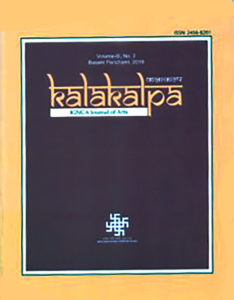
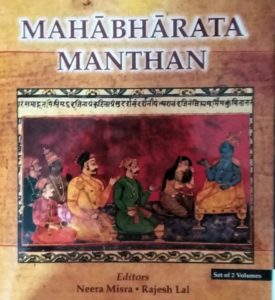
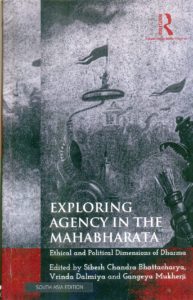
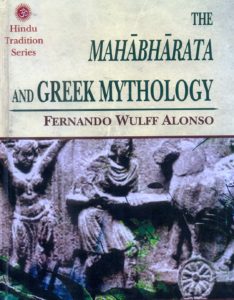 by an East India Company officer arguing that the Ramayana story was strongly influenced by the Iliad. Other than Megasthenes’ references to Indians carrying banners of Heracles and worshipping Dionysus, the Greek scholar Dios Chrysostom (40-120 AD) mentions translations of the Iliad in India. The Roman Claudius Aelianus (175-235 AD) reiterated this (e.g. the Trojan horse becoming Bhasa’s wooden elephant in Pratigya Yaugandharayana). In 1871 A.F.Weber, refuting M.H.Fauche’s proposition (supported by A.Lillie in 1912) that Homer had used the Ramayana as a guide, claimed that it was merely Buddhist legends grafted on to borrowings from Homer, an argument that W.T.Telang vigorously refuted. Weber cited Odysseus’ archery feat to win Penelope as having influenced the archery contests of Rama and Arjuna, ignoring that Rama breaks the bow and Arjuna does not shoot rivals dead. J.Lallemant argued in 1959 that the Mahabharata (MBH) influenced the Aeneid. In 1961 G.Duckworth argued that Turnus’ portrayal was based upon Duryodhana. In 1968 G.Dumezil put forward his theory of an Indo-European tri-functional ideology illustrated by the Pandavas (the dharma-king, the warrior, the grooms). Now, a Spanish professor in the University of Malaga has built up a strong case that the Homeric cycle and other Greek myths were adapted for the MBH.
by an East India Company officer arguing that the Ramayana story was strongly influenced by the Iliad. Other than Megasthenes’ references to Indians carrying banners of Heracles and worshipping Dionysus, the Greek scholar Dios Chrysostom (40-120 AD) mentions translations of the Iliad in India. The Roman Claudius Aelianus (175-235 AD) reiterated this (e.g. the Trojan horse becoming Bhasa’s wooden elephant in Pratigya Yaugandharayana). In 1871 A.F.Weber, refuting M.H.Fauche’s proposition (supported by A.Lillie in 1912) that Homer had used the Ramayana as a guide, claimed that it was merely Buddhist legends grafted on to borrowings from Homer, an argument that W.T.Telang vigorously refuted. Weber cited Odysseus’ archery feat to win Penelope as having influenced the archery contests of Rama and Arjuna, ignoring that Rama breaks the bow and Arjuna does not shoot rivals dead. J.Lallemant argued in 1959 that the Mahabharata (MBH) influenced the Aeneid. In 1961 G.Duckworth argued that Turnus’ portrayal was based upon Duryodhana. In 1968 G.Dumezil put forward his theory of an Indo-European tri-functional ideology illustrated by the Pandavas (the dharma-king, the warrior, the grooms). Now, a Spanish professor in the University of Malaga has built up a strong case that the Homeric cycle and other Greek myths were adapted for the MBH.